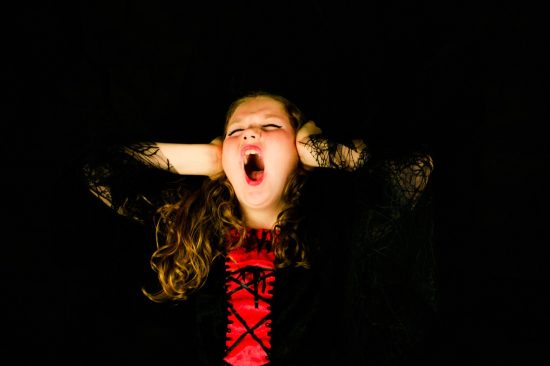
When you notice that your child is short tempered, stubborn, is resistant to instructions or finds it difficult to make friends, what do you usually think of the situation?
Most of you think of it as a behavior problem, and this is a natural line of thought. You infer that the child needs better disciplining and stricter parenting, perhaps. Then, you try to resolve the problem using this understanding. You are firm with the child, try not to give in to his demands and try to encourage him at regular intervals to learn healthy behaviors.
Haven’t you noticed that sometimes, even if you follow all these techniques, the child’s behavior does not change? Or, that it gets worse?
In practice, we see this happening with several children. Their behaviors become more severe with time, until parents start to give up hope.
What Really Is Going On?
Your understanding of the child and the situation is not wrong, only it is possibly incomplete.
You understood the situation as you saw it. You saw tantrums and cranky behavior. So you understood the situation as a behavioral problem and put in effort to change the child’s behavior.
What’s amiss in this approach?
Well, there are parts of the problem that are obvious in the child’s behavior. But, these are parts; or as we say, symptoms. The roots of the problem are often not obvious in the child’s behavior. Remember, the child’s understanding of the world and communication ability are still developing. Children will not be able to identify and communicate what really is happening to them internally. So, one would be mistaken if one equates what the child does with what he or she is, internally. The roots of any problem are always deeper than just the symptoms. To help the child, it is crucial to keep this in mind and to understand what these roots are.
One crucial root of behavior problems is almost always ‘low self esteem’. A child who is not comfortable with who he or she is internally will often have behavioral problems. However, the link between low self esteem and behavior problems is not always clear. Hence, you might altogether miss recognizing that your child has low self esteem, which would mislead all your efforts in helping the child get better.
The following paragraphs should make it easier for you to understand low self esteem more holistically, so that you can then understand your child better.
What Is Low Self Esteem The Way We Know It?

When you think of a child having low self esteem, what image spontaneously comes to your mind? That of a quiet, shy child, who is sensitive, who cries easily perhaps and who is afraid of taking initiative.
These qualities again are not wrong or incorrect. But, they are not the only indicators of low self esteem.

Is Your Child Having Low Self-Esteem?
Counseling can be a great tool for you to support and understand your child's emotional needs to ensure a happy, joyful childhood.
We are here for you.
What Truly Is Low Self Esteem?

Low self esteem in its essence means that one is not comfortable with himself, as he is – he is not happy being who he is.
I want you to imagine being in such an emotional state – if you are not internally comfortable being who you are, what would that do to the way you see yourself, and the world around you?
Do you think you would have been easily provoked? Pessimistic and thinking of the negative? Would little things have made you upset? – because they didn’t go your way?
Even in imagination, you probably said ‘yes’ to most of these questions.
Think of a person you know who is constantly grouchy, irritable or demanding. Now look deeper within that person. What would you be likely to see at his very core? – Happiness and contentment? Or a sense of lack in what he is as a person?
The answer is clear. Low self esteem at a deeper level certainly leads to overt disturbances in behavior. You are now seeing the problem from its root, not just its surface.
What Is The Connection Between Behavioural Problems And Low Self Esteem?
There are two ways in which behavior problems could be connected to low self esteem.
One is a direct connection. Because the child does not feel good about himself just as he is, he feels a sense of failure very easily. As an example, for other children, not getting a toy they want is mild disappointment. But for a child with low self esteem, it would seem like ‘failure’ – failure to get what he wanted. More than the toy, it is a feeling of success that he craves. He wants to change his inner feeling of failure. Hence, he devotes all his energy into getting the toy.
Ironically, this struggle of the child is totally invisible to anybody watching his behavior or interacting with him. As spectators, all you see is the stubborn, unrelenting child who is insistent on getting a toy. Hence, the root of the problem remains unaddressed.
The other connection between behavior problems and low self esteem is a more pervasive, indirect connection. If I were to feel low about myself, automatically, I would feel less happy, more anxious, more upset. I would easily feel uncomfortable in situations, be less willing to try out new things and feel easily threatened by changes in the environment. This feeling is not connected to any specific event or occasion. It is an internal feeling that stays pretty much throughout, like a layer or filter through which the child experiences life. Slowly, it shows in behavior as irritability, short-temperedness, crankiness etc.
What Can You Do To Support Your Child?

Understand the Child
As a first step, try and understand your child for what he is. Be attentive to the child’s emotions rather than just his behavior. Try and put yourself in his shoes, unconditionally. Question yourselves about what the child is likely to be undergoing. Even if you do not immediately understand the answers, you would have begun thinking in the right direction. More ways of relating to your child will open up in your mind once you begin thinking this way. And empathy is often the foundation upon which everlasting, supportive and strong relationships are built.
See More to the Child than his Stubborn Behavior
Stubbornness and difficult behavior are distinctive; they stand out, especially since the child repeats such behavior. Slowly, one starts seeing the child as ‘a stubborn child’. Stubbornness and aggressiveness are not the only qualities that the child possesses. Yet, because you correct his stubborn behavior more often than other behaviors, slowly, the other qualities become relegated to the background. You might internally know about other good qualities that the child possesses. Yet, it is important to consciously remind yourself that the child is more than just a stubborn, irritable, angry person.
Give the Child Positive Feedback
Low self esteem makes children more prone to noticing negative things about themselves. To add to that, their behavioral problems ironically lead to them getting more negative feedback. Hence, it becomes all the more necessary for parents and close ones to provide positive feedback to the child. Such feedback needn’t always be for the child’s accomplishments or what he does, it could also be directed at what he is as a person. Feedback about the child’s intrinsic qualities such as kindness, affection, willingness to share, curiosity etc is a great way to raise the child’s belief in himself as a person. This is because such qualities are not affected by success and failure at particular tasks. A child could spoil a painting, or do badly in one test. However, his basic qualities as a person are far more stable, irrespective of outcomes on specific tasks.
Keep feedback simple and genuine. Do not exaggerate the child’s qualities just to make him feel good.
Reassure the Child that it is okay ‘Not to Get it Right’
Children with low self esteem often tend to give up easily. They also have difficulty taking initiative since they wish to avoid a feeling of failure. It is important to reassure them that it is okay not to ‘get it right’ when they try. Explain to them that learning is a process which takes time. Encourage them to go ahead and try when they refuse to, or are hesitant. When they hesitate, show them how to do the task once and let them try it themselves. It is very important here to understand that they say ‘no’ for attempting tasks because they feel under confident; not because they want to disobey you.
Reassure the Child that Everybody no matter how Small/Big has Rules to follow
Children with behavioral problems often resent rules because they get corrected often by parents and other elders. They see parents and teachers as rule setters and themselves as rule followers. This makes it seem like an unfair game, where they always have to follow what another person commands. It helps to tell children how adults also need to follow rules, and how adults also have to face consequences if they break these rules. Think of it and you have numerous examples available – at work, at public places, even at home. Again, take care to keep your examples realistic and genuine. Examples such as, ‘the bad man will carry me away if I break a rule’ help in managing the child at that moment, however, they either create fear in the child; or, the child realizes with time that no bad man seems to come! Share examples with them that are realistic, such as ‘having to pay money for breaking a traffic rule’, ‘having to face an angry boss for missing deadlines’ etc.
Be Very Careful of Language
Finally, be extremely careful of the language you use while you communicate with the child. Put yourself in their shoes while you communicate with them. Now that you understand what they are undergoing emotionally, refrain from saying anything that would have hurt you, had you been in their place. Be sensitive to their emotions while you communicate with them.
To have low self esteem is hurtful and conflicting. If resolved in childhood, it can help avoid a whole lot of emotional problems in adulthood.
Frequently Asked Questions
If the child’s behaviour is causing significant issues at home, school, or among peers, and if there are signs of depression and anxiety in the child that is concerning, then it would be good to seek professional help from a mental health counselor.
Apart from aggressive behavior, children with low self-esteem may be withdrawn, and may engage in negative self-talk. They may be reluctant to take on new tasks or challenges, or may be sensitive to criticism. Low self-esteem, can thus, manifest in many ways.
About the Author
This article was written by Malini Krishnan, Counselor at Inner Space. This post was consulted & approved by professional therapists practicing online therapy and counseling.
Ask a Therapist
If you are interested to know more about behavioural problems in children and other mental health topics, ‘Ask A Therapist’ is a platform for you to ask your questions related to Mental Health, Mindfulness & Emotional Well-Being to our team of qualified Therapists.






Hi Jigna,
We understand that this is a stressful time for both, your daughter as well as you. Your daughter may be going though a diificult time emotionally which may be getting manifested in her behaviours. We may need to explore these concerns in order to get a deeper understanding of the situation. You can come in for a consultation for the same. We have sent you an email on the process of counseling and the fee structure.
Please feel free to get in touch with us if you have any more queries.
Regards,
The Inner Space Team.
Hi,
My daughter is 10years old and studying in fifth , my daughter doesn’t listen to anyone nor adjust with any one in school or with her friends and only complains about everyone even in schools she never sits in her place she is always out ,not concentrating on her studies and very slow nowadays she has started making her own stories as well as she lies a lot she is only interested in eating and sleeping , when I shout at her for that moment she will keep quiet she even fights with my younger daughter who is six years old , After the birth of my younger daughter I had given first preference to my elder daughter only .She is very emotional and always wants to help everyone, so please please help me what can be done in this matter.
Dear Namratha,
We are glad you found the article helpful. We understand that you are concerned about your son. It seems like your son is going through some emotions that he is unable to clearly identify and express. These emotions could be connected to the birth of a sibling, or some pre-existing emotional conflicts that he has not been able to resolve. From what you have written in, there also seem to be some concerns on the academic front. It would help to consult with a psychologist who works with children. A counselor will gain a complete background of the situation and let you know what needs to be done ahead. Perhaps some play therapy and counseling sessions would help in exploring what is bothering him. Sessions would also help you gain a better understanding of him, and how to deal with his behavior. If you wish to know more about the process/fee structure of counseling, you can either call us on 9833985538 or email us at info@demo.innerspacetherapy.in
We’d be glad to help
Hi,
This article will surely help so many parents. I was going thru this since i face the same problem. My 9 year old son seems not intetested in any thing. Now i have a little one who is just a month old, so i m not able to concentrate much but this behaviour was earlier too but not so worse i think.
He is not at all respecting elders if we say something he will argue nd not listen. His behaviour is worse in front of his father who pampers him a lot. He will not listen to us. Brings lot of complain when he goes down to play with his friends, he does not complete his notes in the class. He is not a fast writer. Not able to concentrate in one think. But he listen to most of my words. If i show tht i m angry he gets afraid and will do his work nd will eat his food fast etc.. but in front of my husband he will not listen too me too nd the situation worsen. Pls help me i m not understanding what to do.
Namratha.
Dear Asmita,
We are so glad that you liked our article and found it helpful. We appreciate the encouragement. We understand your concerns for your daughter and would be glad to help her out. We have sent you the requested details via email. Please check for an email from info@demo.innerspacetherapy.in
Warm Regards.
Thank you so much for putting up such an article of low self esteem n behavioural issues which i think may be is concern for so many parents. It is really very helpfull.
I understood about it but i still would like a counselling session for me n my daughter as it is the crucial face of life where if not taken care now then would be difficult to handle it later. As i dont blame her for such situation but myself as well and i want to sort things at earliest as in not more than 2 years she will get into her teens and we dont want to regret later.
Pls give me contact details n fee structure n required data. Thank u so much.
Dear Manish,
We are only glad when we manage to clarify concepts and help people connect better to their close ones 🙂
We felt that children with behavioral difficulties are often misunderstood and that their vulnerable side remains unseen due to their tantrums and aggressive behavior. Hence, we wrote this article.
We wish you the very best in your efforts and we wish your son well too
Many Thanks
What a fantastic article …after months of searching i reached here and almost cried when i learnt how you have related the low self esteem to behaviroal issues …all my understanding about low self esteem has changed. your article is an eye opener . While i followed the rules you mentioned but wasn’t trying to understand what was wrong with my 6.5 year old CVI ( visual impariment) SPD(Sensoary processing Disorder) with frequent episodes of seziures. We believed it was all due to medicine which is carrying a side effect.
I want to read and understand more and more about better understanding my Son. I thanks you for writing such an article and will be using your article as a guide to handle the issues with my Son.
Thanks a lot !!
Dear Mohan,
Thank you for writing in to us. We’d be glad to support you in whatever way we can.
It would help to determine the underlying reasons why his communication skills seem to be poor. These reasons could be emotional in nature. Else, they could also be due to some innate factors in the child. Depending on what the reasons are, a plan to build his communication and social skills can be devised. A psychologist would be able to help you with the same. We suggest you initially book a consultation session, where you can give the psychologist some detailed background into the situation. If your son has undergone any psychological assessment, you can also carry the reports along. The psychologist would accordingly suggest what needs to be done ahead.
Do write back if you want more details about the process and fee structure of counseling at Inner Space. Our email id is info@demo.innerspacetherapy.in
Warm Regards
Hi,
My son is 6.5 years old, studying in 1st std. He has problems like less attentive, easily gets distracted, can not focus for long time, short tempered for which he is getting occupational therapy, special ed, treatment in one of the child development center. I am worried about his poor communication skill. he can not express himself in any situation & at times come crying even if a younger child shout at him.
I need you opinion & advice.
Regards,
mohan